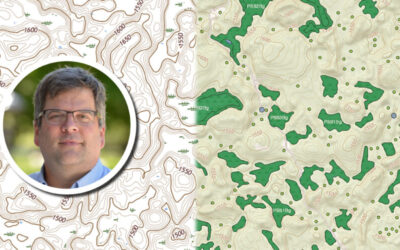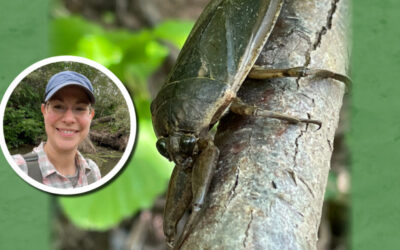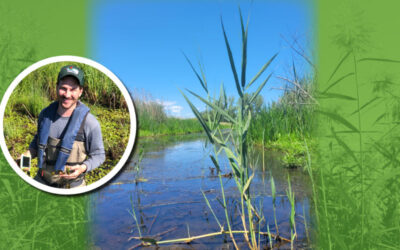Wetland Coffee Break
The Wetland Coffee Break series helps keep our community of wetland lovers connected and learning about wetlands throughout the year, from anywhere! Bring your coffee and learn about wetlands, the plants and animals that call them home, and the many natural benefits they provide to our communities. Sessions are held on Zoom and feature time for audience Q&A.
See below for a list of upcoming presentations and to register. Once you register, you’ll receive an automatic email including the URL link and password you’ll need to access the meeting. We record and post each presentation so you can watch any that you missed live. You’ll find links to these recordings below, and you can also find them on our Facebook page.
We are grateful to all of the presenters for sharing their knowledge and expertise and to everyone interested in learning more about wetlands! If you are interested in giving a Wetland Coffee Break presentation, or if you have a wetland topic you’d like to see covered, please contact Katie.Beilfuss@wisconsinwetlands.org.
We are now able to provide attendance verification to Wetland Coffee Break audience members who attend the live sessions and request this service. We created this mechanism in response to requests from members of the Wetland Coffee Break audience who would like to apply their Wetland Coffee Break learning to their continuing education or certification requirements. Learn more about how to receive attendance verification here.

Register for a Wetland Coffee Break
The importance of state agency collaborations for effective wetland conservation
Erin O’Brien, Wisconsin Wetlands Association
Friday, January 16, 2026
10:30 am CT
Description
Wisconsin Wetlands Association’s policy priorities emphasize building the enabling conditions needed to implement wetland conservation across the state. While our legislative work may have the highest profile, in recent years we have also invested heavily to build collaborations that help state and local agencies integrate wetland priorities into existing programs. In this talk, I’ll share the objectives of our state agency program work and provide a high-level overview of the projects with Wisconsin Department of Natural Resources, Wisconsin Department of Agriculture, Trade & Consumer Protection, and Wisconsin Emergency Management. I’ll also invite reflection on how these efforts translate into more opportunities for the wetland professional community to plan and implement successful projects.
Erin O’Brien joined the staff of Wisconsin Wetlands Association in 2004. Her current work focuses on strengthening state laws and regulations governing wetland management, building capacity to help integrate wetland conservation into state-sponsored programs, and providing support to communities interested in restoring wetlands to solve problems.
Wisconsin’s peatlands: Carbon powerhouses for climate action
Alex Clayton Moya, Pew Charitable Trust
Friday, January 30, 2026
10:30 am CT
Description
Peatlands are waterlogged wetlands that accumulate peat—organic material storing immense carbon reserves. Globally, they cover just 3% of land yet hold more carbon than all forests combined, and in Wisconsin, they are the most carbon-dense ecosystem in the state. Restoration of degraded peatlands in Wisconsin could cut 2.3 million metric tons of CO₂ annually—roughly equal to removing 500,000 cars from the road—while safeguarding biodiversity, filtering water, and protecting communities from floods and fire. Investing in peatland protection and restoration has the potential to deliver one of Wisconsin’s most impactful strategies for climate mitigation and resilience.
Alex Clayton Moya works to incorporate conservation and restoration of coastal blue carbon and peatland habitats in state and national climate policies for Pew’s U.S. conservation project. Before joining Pew, Moya worked for the U.S. Environmental Protection Agency on nonpoint source pollution and Columbia River salmon issues in the Pacific Northwest. Earlier in her career, she worked on international environmental policy with an emphasis on wildlife conservation and served as a Peace Corps volunteer in Nepal. Moya holds a bachelor’s degree in biology from Bucknell University and master’s degrees in public policy and in natural resources and environment from the University of Michigan.
Carnivorous plants of the Northwoods
Emily Stone, Naturalist & Education Director, Cable Natural History Museum
Friday, March 13, 2026
10:30 am CT
Description
In some low-nutrient wetlands, plants reverse the food chain and become carnivorous to meet their needs. Discover the beauty and the impressive adaptations of these charismatic Northwoods residents with naturalist Emily Stone.
Emily Stone is a naturalist by birth, training, profession, and passion. After earning a Field Naturalist master’s degree from the University of Vermont with a wetland-focused project, Emily became the Naturalist/Education Director at the Cable Natural History Museum in Cable, Wisconsin. Emily writes a weekly “Natural Connections” column published in more than 20 local and regional newspapers. Her third Natural Connections book was published in November 2025.
Watch previous presentations
Click “Older Entries” below to see more past presentations, or view our Google Sheet index of past presentations here.
Wetland Coffee Break: Wetlands in Wisconsin’s mega moraines
One of the largest concentrations of wetlands in our state is found in a unique area of large hummocky moraines that spans across north-central Wisconsin.
Wetland Coffee Break: On, in, and underwater: Life cycles and life history of wetland invertebrates
Join Dr. Jessica Orlofske of UW-Parkside to learn about Wisconsin’s wetland invertebrates that skate on the surface, swim in the water column, or crawl along the substrate.
Wetland Coffee Break: Wetlands and Phragmites: Management at a landscape scale
Presenter Matt Puz discusses wetland dynamics as well as Phragmites biology and ecology, and how understanding these two concepts can lead to more effective management.
Wetland Coffee Break: Restoring wetlands in the Mukwonago River watershed
Hear about the the experience of project planning, restoration, and maintenance of the Mukwonago Davis Restoration Project, and the trials and tribulations of implementing a large wetland restoration project through key partnerships.
Wetland Coffee Break: Let’s talk turtles!
Ever wonder what kind of turtle you just found crossing the road, or how to tell one kind of turtle from another, or where to look to find them?
Wetland Coffee Break: What’s the buzz? Drone uses in wetlands
Drones can do a lot more than take pretty pictures. We can now utilize drones for high-resolution imagery, artificial intelligence, spraying invasive species, or seeding native species.






